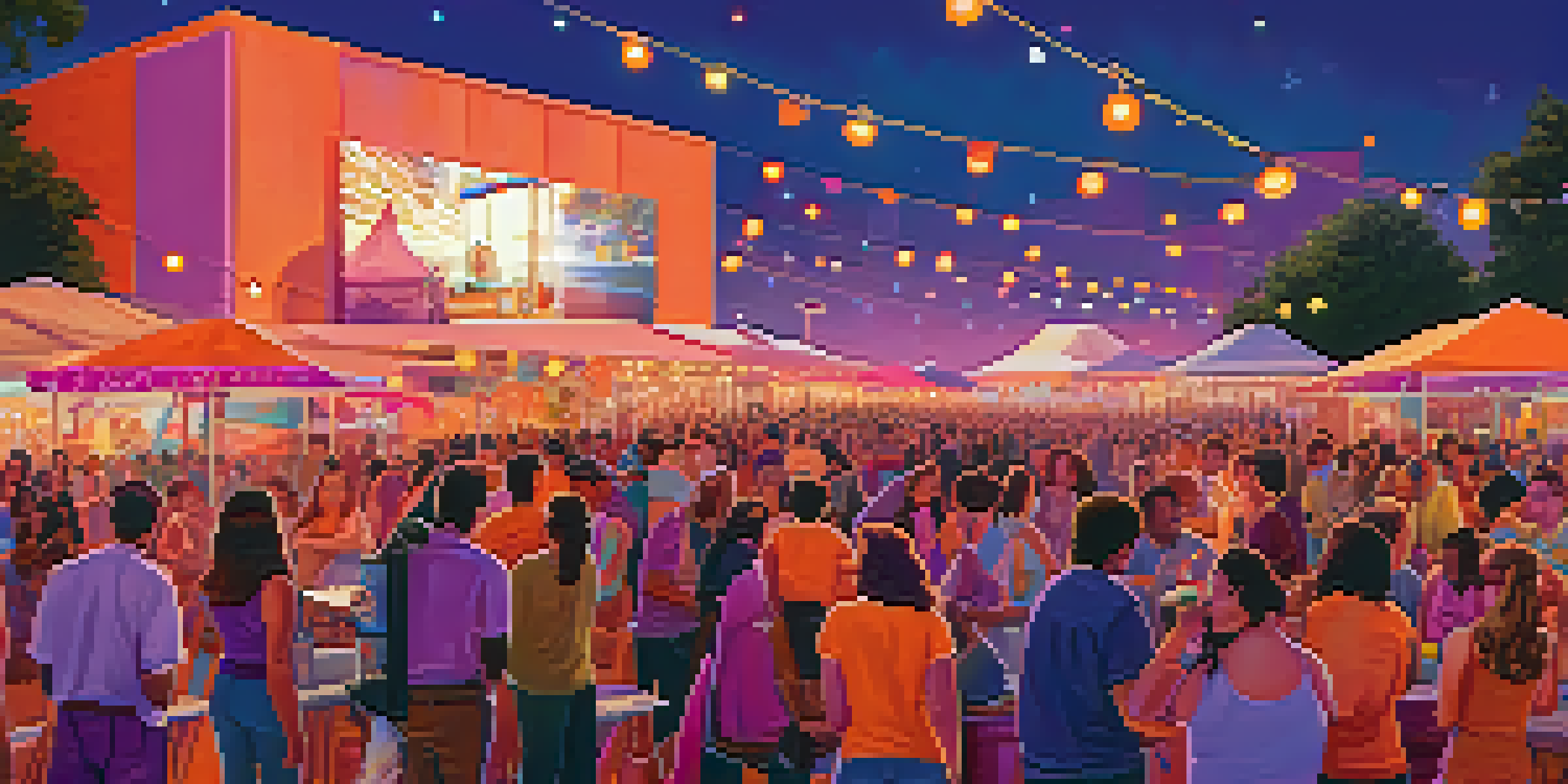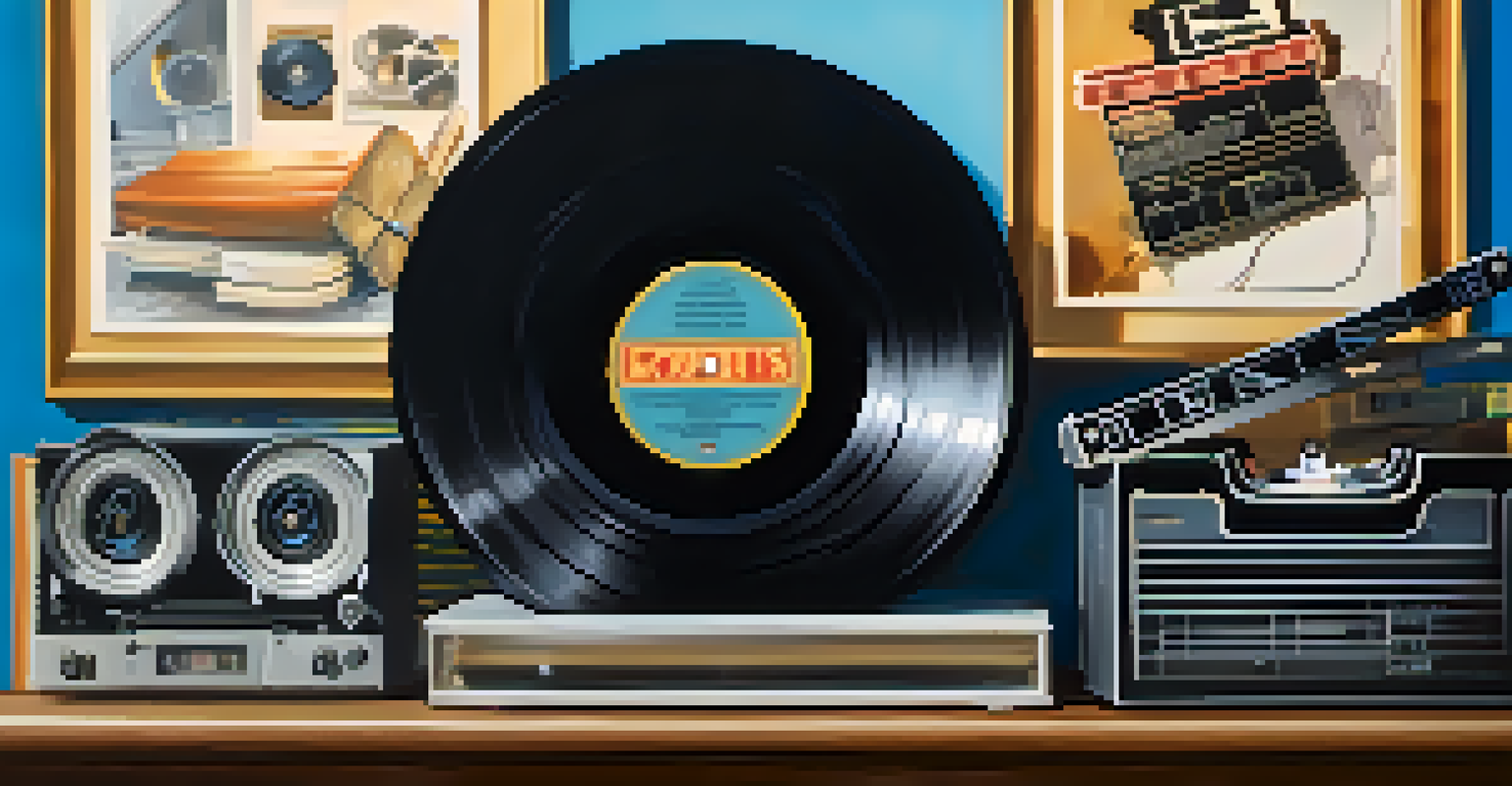The Rise of Movie-Inspired Music Genres in Popular Culture

The Fusion of Film and Music: A Historical Perspective
Movies and music have always shared a close relationship, dating back to the early days of cinema. The classic silent films relied heavily on live orchestras to convey emotions, setting a precedent for the integral role of music in storytelling. Over the decades, soundtracks evolved, becoming critical in enhancing the cinematic experience and even launching music careers.
Music is the shorthand of emotion.
For instance, the rock and roll explosion in the 1950s was heavily influenced by films that depicted youth culture and rebellion. Soundtracks from movies like 'Grease' and 'Footloose' not only topped charts but also became cultural phenomena, creating a legacy of music intertwined with film narratives. This historical context sets the stage for understanding today's movie-inspired music genres.
As we move into the modern era, we see a resurgence of this trend, with filmmakers and musicians collaborating to create sounds that resonate with audiences. This synergy continues to redefine how we perceive both music and film, leading to the emergence of new genres that reflect contemporary themes.
How Soundtracks Shape Music Trends
Soundtracks have a unique power to shape music trends, often introducing audiences to new genres and artists. Take, for instance, the 'Guardians of the Galaxy' soundtrack, which revived interest in classic rock, breathing new life into songs from the '70s and '80s. This phenomenon highlights how a well-curated soundtrack can influence listener preferences and reignite nostalgia.

Moreover, movies often serve as a platform for emerging artists. For example, the song "Shallow" from 'A Star Is Born' not only won awards but also catapulted Lady Gaga into a new stratosphere of fame, showcasing how film can elevate musical talent. This dynamic relationship between film and music continues to evolve, creating fresh opportunities for artists.
Music Enhances Film Storytelling
The strategic use of music in films elevates storytelling by guiding audience emotions and creating memorable experiences.
As soundtracks become more eclectic, they reflect a broader spectrum of musical styles. From hip-hop to indie rock, the inclusion of diverse genres in film soundtracks allows for a fusion that resonates with various demographics, ultimately shaping popular culture.
The Rise of Genre-Bending Soundtracks
In recent years, we've witnessed a trend towards genre-bending soundtracks that collapse traditional musical boundaries. Films like 'Black Panther' showcased a rich blend of hip-hop, Afrofuturism, and orchestral elements, creating a sound that was both innovative and culturally significant. This approach not only diversifies the listening experience but also invites audiences to explore unfamiliar genres.
Film is a powerful medium that can bring music and visual storytelling together in a way that resonates deeply with audiences.
The success of such soundtracks has encouraged filmmakers to take creative risks, pushing the envelope on what constitutes a film score. Artists like Kendrick Lamar have emerged as key players, proving that collaboration can lead to groundbreaking results. This genre-blending not only appeals to a broader audience but also sparks conversations about cultural representation in music.
Ultimately, these soundtracks reflect the complexities of modern identity and storytelling. They serve as a mirror for society, allowing listeners to engage with various themes while enjoying a unique auditory experience.
Cultural Impact of Genre-Inspired Music
Movie-inspired music genres often mirror societal changes, acting as a soundtrack to cultural movements. The rise of country music in films like 'A Star Is Born' has reignited interest in this genre, while also influencing fashion and lifestyle trends. This cultural impact extends beyond music, shaping how we view different lifestyles and communities.
For instance, the popularity of hip-hop in films such as '8 Mile' has helped to elevate the genre from niche to mainstream, breaking down barriers and sparking conversations about race and identity. As audiences connect with the music, they also engage with the narratives presented, fostering a deeper understanding of the cultural contexts from which these genres arise.
Soundtracks Shape Music Trends
Well-curated soundtracks have the power to introduce new genres and artists to audiences, influencing musical tastes and reviving interest in classic songs.
The fusion of film and music continues to redefine cultural landscapes, emphasizing that art is not created in a vacuum. Each genre inspired by film tells a story, connecting audiences through shared experiences and emotions.
The Influence of Music on Film Narratives
Music plays a pivotal role in shaping film narratives, often guiding audience emotions and perceptions. From the heart-pounding scores of action films to the soft melodies of romantic dramas, the right music can elevate a scene, making it unforgettable. This relationship is reciprocal, as films often inspire artists to create music that complements these narratives.
Take for instance the use of original songs in films like 'Frozen' — the song "Let It Go" became a cultural phenomenon, transcending the film itself. It sparked a wave of covers and parodies, illustrating how a single song can infiltrate popular culture. This phenomenon proves that music can outlive its cinematic origins, becoming part of a larger cultural dialogue.
As filmmakers increasingly rely on music to tell their stories, we can expect to see more innovative collaborations. This interplay between music and film not only enriches the storytelling experience but also broadens the scope of creativity for artists and filmmakers alike.
The Role of Streaming Platforms in Popularizing Genres
The rise of streaming platforms has transformed how we consume music and film, significantly impacting genre popularity. Services like Spotify and Apple Music have playlists dedicated to movie soundtracks, making it easier for fans to discover and enjoy music inspired by films. This accessibility has led to a surge in interest for niche genres that may have previously gone unnoticed.
Additionally, algorithms personalize recommendations, allowing listeners to explore music that aligns with their tastes while also exposing them to new genres. This dynamic creates a diverse listening environment where movie-inspired music can thrive, reaching audiences far beyond traditional channels.
Streaming Platforms Boost Genres
The emergence of streaming platforms has transformed music discovery, allowing niche genres inspired by films to reach broader audiences.
As streaming continues to dominate, we can expect to see even more cross-pollination between film and music genres. This evolution will likely shape the future of both industries, fostering a culture of collaboration and innovation.
Future Trends in Movie-Inspired Music Genres
Looking ahead, the future of movie-inspired music genres appears promising, with emerging technologies paving the way for new possibilities. The integration of virtual reality (VR) and augmented reality (AR) in films could lead to immersive sound experiences that engage audiences in unprecedented ways. Imagine stepping into a film and experiencing its soundtrack as if you're part of the story — the potential is limitless.
Moreover, as global collaborations become more common, we can expect to see a rise in fusion genres that blend regional sounds with mainstream influences. This will not only enrich the musical landscape but also promote cultural exchange, allowing diverse voices to be heard in both film and music.

Ultimately, as filmmakers and artists continue to push boundaries, movie-inspired music genres will likely evolve, reflecting the complexities of modern society. This dynamic interplay will keep audiences engaged, ensuring that the relationship between film and music remains vital and ever-changing.